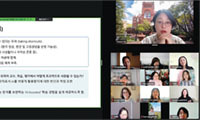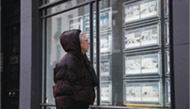Japan Is Now A Tourism Lure To Other Asians

In Tokyo, advertising employees greet Chinese visitors, whose numbers are soaring.
By MARTIN FACKLERSHIRETOKO NATIONAL PARK, Japan - Once prohibitively expensive, Japan is suddenly drawing soaring numbers of Asian tourists who shop at the nation’s department stores, lounge in its hot spring resorts or explore remote corners, like the stretch of pristine mountains and forests near here on Japan’s northernmost tip.
While a boon for Japan’s faltering tourism industry, the new tourists are also a sign of larger economic changes in one of the world’s most dynamic regions.
Japan itself was once known for its free-spending tourists, who flocked to boutiques from Hong Kong to Fifth Avenue. But as Japan’s economy stalled for the last dozen or so years, rapid development in countries like China and South Korea raised living standards there.
Those countries are now catching up with slowgrowing Japan, long the region’s dominant economic power. Indeed, Japan’s dwindling, but still potent, lead in technology is a major draw for Asian tourists, who are as likely to visit a Toyota car factory as a Zen temple.
At the same time, there has been a decline in the number of people going abroad from Japan. The number of Japanese traveling abroad has fallen 3 percent from the peak in 2000 of 17.8 million, the government-run Japan National Tourist Organization said.
Officials from the tourist group attributed the drop among the young Japanese to falling wages and more modest lifestyles.
By contrast, the number of visitors to Japan from South Korea, Taiwan, China and Hong Kong almost doubled last year from five years earlier, to 5.36 million, according to the tourist group. Those four regions alone accounted for nearly two-thirds of all foreign visitors to Japan last year, the organization said.
But far from being concerned about yet another sign of their nation’s declining status, many Japanese seem to embrace this change. The government helped open the gates five years ago by waiving visa requirements for tourists from Taiwan and South Korea.
Asian visitors are regarded by a growing number of Japanese as a financial boost for Japan, whose vitality has been sapped by economic maturity and an aging population.
“Asia has closed the gap in economic power,” said Yukiko Fukagawa, an economics and politics professor at Waseda University in Tokyo. “And Japan is slowly realizing that maybe this is not such a bad thing.”
In the Ginza shopping district of Tokyo, the excitement these days is all about the large numbers of rich Asian tourists, most from China. This has pushed stores to begin hiring Chinese-speaking clerks and keep stacks of Chinese bills by cash registers.
At the marble-columned Mitsukoshi department store, one of Tokyo’s fanciest, wealthy Chinese buy Japanese- and European-brand clothes and handbags by the dozen, and spend hundreds of thousands of dollars, apparently on a whim, for a watch or a painting, said Shoji Saito, manager of overseas-related business.
Mr. Saito said the store had not experienced such big-spending shoppers since Japan’s own such era in the 1980s.
“Asian tourists are our new growth market, he said.
Many Asian tourists interviewed said they liked to shop here because Japan has the latest fashions first, and at prices way below those in many other Asian countries, where tariffs are steep. They also said they liked visiting Japan because it was close, safe and cleaner than much of the rest of Asia.
But many also say they are drawn by a deep fascination for Japan. Now that they can afford to come, they say they want to see the country that has long been the region’s front-runner in high technology, fashion and other realms of popular culture. They said they felt envy and respect for Japan as the region’s only fully developed nation, even if they did not always agree on matters like the events of World War II.
“We feel very close to the Japanese culturally, but they are also still ahead,” said Kao Yu-jeng, a 50-year-old schoolteacher who was part of a Taiwanese tour group visiting Shiretoko park, on Japan’s northern island of Hokkaido. “We want to know more about what makes them tick.”
According to the Taiwanese government’s Tourism Bureau, Japan passed Macao last year to become the second-most-popular overseas destination for Taiwanese going abroad, after Hong Kong.
“Japan used to be a very distant presence,” said Hsu Ya-shan, assistant director in the Tokyo office of the Taiwan Visitors Association, a Taiwanese government-run tourism promotion agency. “Now, it feels a lot closer.”
“Japan always had this huge, unnatural imbalance of sending out far more tourists than it took in,” said Daisuke Tonai, a senior assistant manager at the tourist group. “The situation is finally becoming more normal.”
Mr. Tonai said surveys also showed Asian tourists came to Japan for different reasons than Westerners. While Americans said they came to see cultural attractions like temples, Asians cited shopping, followed by hot springs and nature. Visits to factories are also popular, he said. But there is one complaint.
“Taiwan is getting closer, but Japan is still ahead when it comes to prices,’’ Lin Hsiao-ching, a 44-year-old homemaker who was also part of the Shiretoko tour group, said with a laugh. “We still have to keep an eye on every bill.
스마터리빙
more [ 건강]
[ 건강]이제 혈관 건강도 챙기자!
[현대해운]우리 눈에 보이지 않기 때문에 혈관 건강을 챙기는 것은 결코 쉽지 않은데요. 여러분은 혈관 건강을 유지하기 위해 어떤 노력을 하시나요?
 [ 건강]
[ 건강]내 몸이 건강해지는 과일궁합
 [ 라이프]
[ 라이프]벌레야 물럿거라! 천연 해충제 만들기
 [ 건강]
[ 건강]혈압 낮추는데 좋은 식품
[현대해운]혈관 건강은 주로 노화가 진행되면서 지켜야 할 문제라고 인식되어 왔습니다. 최근 생활 패턴과 식생활의 변화로 혈관의 노화 진행이 빨라지고
사람·사람들
more많이 본 기사
- 남가주 전역에 ‘물폭탄’… 성탄 연휴 ‘대혼란’
- [2025년 한 해 ‘진 별’들] 미주 한인사회 원로들 ‘역사의 뒤안길’로
- 체포 불체자 수만명 물류창고에 수감 추진
- 여성 살해·자녀 납치 한인 ‘수배’
- 크리스마스 연휴 음주운전 ‘꼼짝마’
- 우크라이나도 “Merry Christmas!”… 지구촌 성탄 축하
- ‘라스베가스에서 만난 한인들’
- 한인타운 한복판 주유소서 강도 ‘칼부림’
- “소변 불편한데 주저하다 방광 망가져”
- 새해 더 건강해지기 위한 의사의 과학적 조언 10가지
- 서태지, 딸·엘리와 1년 만에 근황 “좋은 소식 없어 안타까워”
- 트럼프 ‘전쟁할 결심’?… 미군 특수부대 카리브해 이동
- “평신도 시각에서 본 선교 준비 실제와 영적 묵상”
- ‘시민 리더십 아카데미’ 신청 접수
- 난방기 뜯자 ‘비밀공간’ 은신 마피아 보스 체포
- “대학 학자금 상환 안하면 임금 압류한다”
- CBS가 보류한 ‘불법체류자 추방’ 보도, 캐나다서 원본 유출
- 최준희, 엄마 故최진실 생일 맞아 추억 “우리 마미 축하”
- H-1B ‘10만 달러 수수료’ 연방법원, 이의소송 기각
- 중산층이 집을 사지 않는다?… 챗GPT가 내다본 주택시장 미래
- 선우용여 “아들, 돈 없어 개밥 먹기도..아파트 마련해줬다”
- 서유리, ♥법조계 남친 데이트 신청에 두근.. “돈은 내가 낸다”
- 테슬라, “비상사태 시 차문 안 열려”
- 피클볼이 바꾸는 부동산의 얼굴
- 북가주 한인 독립운동가 ‘이대위의 날’ 제정 추진
- 바야흐로 ‘귀금속 시대’… 금·은·구리까지 사상 최고
- “소방관 노고에 진심으로 감사해요”
- [기고] 안정의 기준은 어떻게 제도가 되었나
- [스티브 강 ‘인사이드 미국’] 2026 중간선거: 트럼프 지지율 하락이 말해주는 것
- [윌셔에서] 우리 안의 ‘생각하는 사람’을 깨울 시간
- 오헌, 샌디에고 떠나 피츠버그와 입단 합의… 송성문에겐 기회
- LA 마약조직 집중 단속 갱단원 등 수백명 체포
- 한인들 위한 무료 법률 상담회 개최
- 여성 살해·자녀 납치 한인 ‘수배’
- [성탄절 앞둔 우울한 경제상황] ‘내 코가 석자’… 기부 급감
- 뚜레쥬르, 뉴욕시 맨해튼 매장 오픈
- 원·달러 환율, 당국 개입에 42원 폭락
- 팔레스타인서 구금된 한인 여성 무사 귀환
- 미·중 무역전쟁 휴전 지속… 반도체 관세도 보류
- ‘16kg 감량’ 홍현희, 다이어트 비결 뭐길래..날렵해진 턱 라인
- 국방부 “中, 美 안보 위협할 군사력 보유…본토 갈수록 취약”
- [유혜미 칼럼] 치솟는 환율, 경제 지표의 역설
- [전문의 칼럼] 과호흡증후군
- 백악관, 군에 “베네수엘라 원유 격리하라” 총력 지시
- 트럼프, 李대통령에 ‘백악관 황금열쇠’ 선물… “최고의 협력관계”
- [팜스 카지노 리조트] “새해 맞이는 팜스에서… 푸짐한 행사들과 특별요리”
- [성탄절 앞둔 우울한 경제상황] 연말 선물로 중고품 급증
- 한국외대·연세대·한양대 GCEO 연합골프대회 성황
- 샌프란시스코, 한국 방문해 이정후와 함께 야구 클리닉
- 조지아 역주행 사고, 한인 남편 이어 임신 아내·태아 사망
1/5지식톡

-
 미 육군 사관학교 West Poin…
0
미 육군 사관학교 West Poin…
0https://youtu.be/SxD8cEhNV6Q연락처:wpkapca@gmail.comJohn Choi: 714-716-6414West Point 합격증을 받으셨나요?미 육군사관학교 West Point 학부모 모…
-
 ☝️해외에서도 가능한 한국어 선생님…
0
☝️해외에서도 가능한 한국어 선생님…
0이 영상 하나면 충분합니다!♥️상담신청문의♥️☝️ 문의 폭주로 '선착순 상담'만 진행합니다.☎️ : 02-6213-9094✨카카오톡ID : @GOODEDU77 (@골뱅이 꼭 붙여주셔야합니다…
-
 테슬라 자동차 시트커버 장착
0
테슬라 자동차 시트커버 장착
0테슬라 시트커버, 사놓고 아직 못 씌우셨죠?장착이 생각보다 쉽지 않습니다.20년 경력 전문가에게 맡기세요 — 깔끔하고 딱 맞게 장착해드립니다!장착비용:앞좌석: $40뒷좌석: $60앞·뒷좌석 …
-
 식당용 부탄가스
0
식당용 부탄가스
0식당용 부탄가스 홀세일 합니다 로스앤젤레스 다운타운 픽업 가능 안녕 하세요?강아지 & 고양이 모든 애완동물 / 반려동물 식품 & 모든 애완동물/반려동물 관련 제품들 전문적으로 홀세일/취급하는 회사 입니다 100% …
-
 ACSL 국제 컴퓨터 과학 대회, …
0
ACSL 국제 컴퓨터 과학 대회, …
0웹사이트 : www.eduspot.co.kr 카카오톡 상담하기 : https://pf.kakao.com/_BEQWxb블로그 : https://blog.naver.com/eduspotmain안녕하세요, 에듀스팟입니다…
케이타운 1번가
오피니언
 스티브 강 전 한인민주당협회 회장
스티브 강 전 한인민주당협회 회장 [스티브 강 ‘인사이드 미국’] 2026 중간선거: 트럼프 지지율 하락이 말해주는 것
 김홍일 케이유니콘인베스트먼트 대표
김홍일 케이유니콘인베스트먼트 대표 [기고] 안정의 기준은 어떻게 제도가 되었나
 유혜미 한양대 경제금융대학 교수
유혜미 한양대 경제금융대학 교수 [유혜미 칼럼] 치솟는 환율, 경제 지표의 역설
 성민희 소설·수필가
성민희 소설·수필가 [윌셔에서] 우리 안의 ‘생각하는 사람’을 깨울 시간
 김정곤 / 서울경제 논설위원
김정곤 / 서울경제 논설위원 [만화경] 해수부 부산시대

[왈가 왈부] 내란재판부·정통망법 또 수정… 졸속·땜질 아닌가요
 정숙희 논설위원
정숙희 논설위원온라인쇼핑과 반품, 그리고 그 이후
 파리드 자카리아 / 워싱턴포스트 칼럼니스트 / CNN ‘GPS’ 호스트
파리드 자카리아 / 워싱턴포스트 칼럼니스트 / CNN ‘GPS’ 호스트 트럼프의 새 독트린 “미국을 다시 왜소하게”
 김동찬 시민참여센터 대표
김동찬 시민참여센터 대표 [미국은 지금] MAGA의 분열, 예견된 균열의 시작
1/3지사별 뉴스

“온 세상에 평화를⋯”
숨가쁘게 달려온 2025년을 이제 1주일 남짓 남긴 채 크리스마스 이브를 맞는다. 다사다난했던 한 해를 되돌아보며 마무리하는 연말 시즌과 크리…
H-1B비자 고임금·경력자에 우선권

‘올해는 ICE 이민자 체포 광풍의 해’
올 한해동안 버지니아와 메릴랜드, DC 등에서 연방 이민당국에 체포된 사람이 1만명이 훌쩍 넘는 것으로 조사됐다. 또 미 전국적으로는 22만명…
“ATM기 사용하기 겁나네”

한인들 위한 무료 법률 상담회 개최
샌프란시스코 베이지역 한인회(회장 김한일)는 지난 20일 한인회관에서 북가주 지역 한인들을 위한 무료 법률 상담회를 개최했다. 이날 행사에는 …
여성 살해·자녀 납치 한인 ‘수배’

오늘 하루 이 창 열지 않음 닫기 





















































.png)


댓글 안에 당신의 성숙함도 담아 주세요.
'오늘의 한마디'는 기사에 대하여 자신의 생각을 말하고 남의 생각을 들으며 서로 다양한 의견을 나누는 공간입니다. 그러나 간혹 불건전한 내용을 올리시는 분들이 계셔서 건전한 인터넷문화 정착을 위해 아래와 같은 운영원칙을 적용합니다.
자체 모니터링을 통해 아래에 해당하는 내용이 포함된 댓글이 발견되면 예고없이 삭제 조치를 하겠습니다.
불건전한 댓글을 올리거나, 이름에 비속어 및 상대방의 불쾌감을 주는 단어를 사용, 유명인 또는 특정 일반인을 사칭하는 경우 이용에 대한 차단 제재를 받을 수 있습니다. 차단될 경우, 일주일간 댓글을 달수 없게 됩니다.
명예훼손, 개인정보 유출, 욕설 등 법률에 위반되는 댓글은 관계 법령에 의거 민형사상 처벌을 받을 수 있으니 이용에 주의를 부탁드립니다.
Close
x